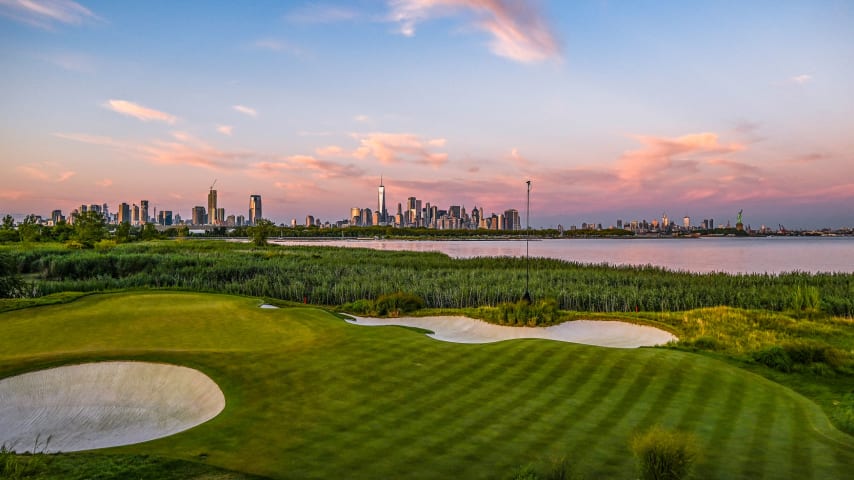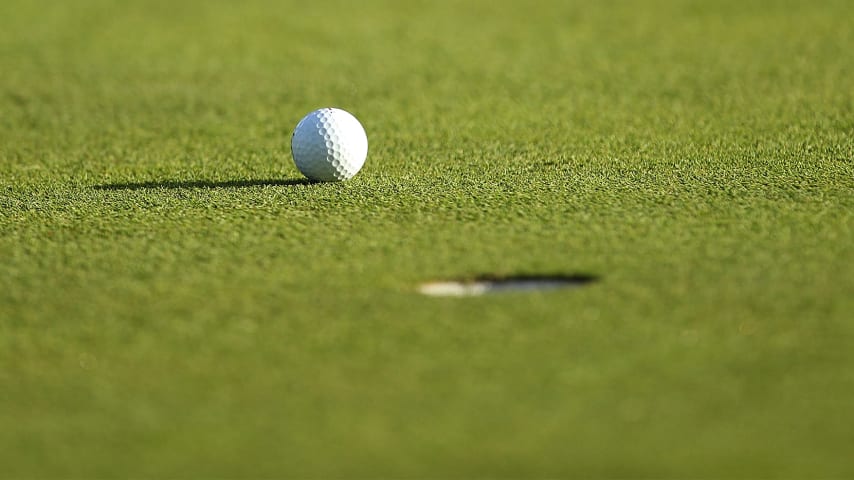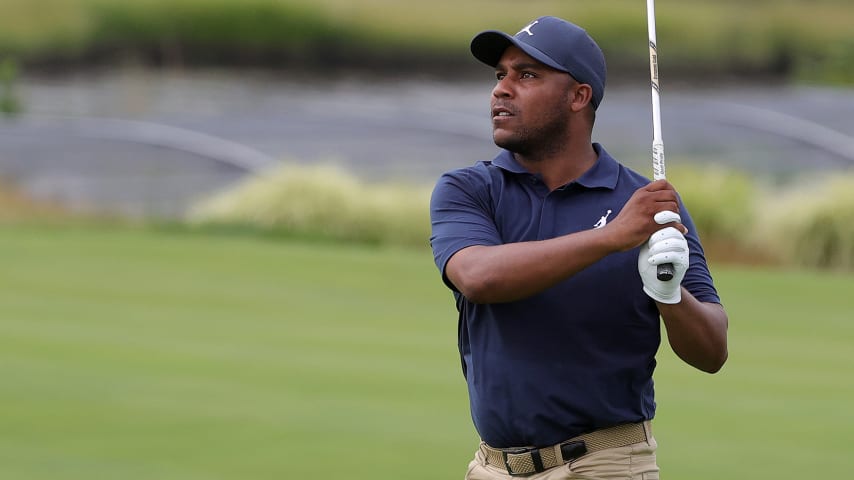Five things to know about Liberty National
6 Min Read

Written by Sean Martin
The FedExCup Playoffs are finally here. To prepare you for all three events, we’ve compiled 5 Things to Know about each venue. This week, THE NORTHERN TRUST visits Liberty National for the fourth time. The former landfill has become one of the world’s most scenic courses, offering vistas of the New York City skyline, as well as a history of dramatic finishes.
1. ONE MAN’S TRASH
Liberty National is known for its views but the site wasn’t always so scenic. The course is built on land that was once a collection of vacant warehouses sitting on contaminated land. It had been the home of a World War I ammunition dump, storage for corroded oil tanks and even an operations base for the Gambino crime family.
But Paul Fireman, the former chief executive of Reebok, fell in love with the site immediately. Besides the scenery, the land had further significance for his family. It is in the shadow of the Statue of Liberty and Ellis Island, where his grandparents arrived from Russia and Australia decades before.
“I absolutely loved the site,” said Fireman, who was introduced to golf while caddying as a boy. “The historical connections with the Statue of Liberty, being so close to the city, in full sightline of the Hudson River and New York Harbor. We plunged right into it. There were risks, and many people questioned the decision to take it on, but to me it was a once- in-a-lifetime opportunity to create something iconic.”
It is the closest course to New York City, sitting on the shore of the Hudson River across from Lower Manhattan. It is so close to the Statue of Liberty that the Associated Press’ Doug Ferguson wrote, “she looks as if she’s holding one of those ‘Quiet, Please’ signs.”
2. IS ANOTHER MAN’S TREASURE
Tom Kite and Bob Cupp, who’d spent more than 15 years as the senior designer for Jack Nicklaus, first met in 1988 when they were both hired to redesign Baltimore Country Club’s West Course. It was the start of a fruitful partnership that collaborated on several courses, included Liberty National.
Kite first heard about the site in the same year he won the U.S. Open. At a corporate outing near Washington D.C., a businessman named Rusty Bayliss showed Kite aerial photographs of the land.
“I said, ‘You’ve got to be kidding me,’” Kite said. “I went out and saw it. And I couldn’t wait to get to Bob and show him the site.”
Building Liberty National was no easy task, however.
The site had to be decontaminated before construction could begin. Plastic was put down, then covered by millions of tons of clay and fill.
“The first time we showed up here, it was a nightmare,” Cupp said. “We were pretty sure any travesty known to man was (committed) on this property.”
Today, the course sits 50 feet above the previous land, allowing it to offer views of the Statue of Liberty on 15 holes. All the elevation changes are manmade.
“When we first saw the property, it was dead flat. There was 2 feet of elevation change,” Kite said. “It was our job to be able to see something that could take place like this before it ever happened, and we were lucky to be able to do it.”
Over 14 years, the club’s construction required moving six million cubic feet of soil, bringing in 70,000 truckloads of sand, adding 5,000 trees and cost $300 million dollars.
Befitting its name, the course opened July 4, 2006.
3. SLOCUM’S CINDERELLA STORY
The FedExCup Playoffs’ first trip to the shadow of the Big Apple resulted in the biggest upset in FedExCup Playoffs history. Heath Slocum holed a 20-foot par putt on the final green to finish one stroke ahead of the star-studded foursome of Tiger Woods, Ernie Els, Padraig Harrington and Steve Stricker.
“I don’t think anybody was expecting him to make that putt at the last,” recalled Harrington. “We were all getting our heads around going out there in a playoff, was looking forward to it. But he did the business.”
Slocum barely snuck into the Playoffs, finishing 124th in the Regular Season standings to earn the second-to-last postseason berth.
Woods and Stricker arrived at Liberty National as the top two players in the FedExCup standings. They missed putts of 7 and 10 feet, respectively, on the final green.
Harrington had won three majors over the previous two seasons and Els was in the midst of his Hall of Fame career, as well.
Slocum’s final round also included a hole-out from 161 yards for eagle on the seventh hole. By moving from 124th to third in the FedExCup standings, he made the biggest single-week move in the 15-year history of the FedExCup.
4. NATIONAL TREASURE
Fireman heard the lukewarm reception that Liberty National received after its first year. “It wasn’t that bad, but it definitely had a tone,” he said. That’s why the course was drastically renovated after it hosted its first PGA TOUR event.Fireman foot the bill, paying for the changes out of his own pocket.
Players found fault with the narrow fairways and small, severely sloping greens. Phil Mickelson, a Liberty National member, recommended the rough should be shorter (shocker!) to give players a better chance at a recovery shot. That’s why 15 of the holes underwent significant changes a year after Slocum’s win.
Five greens were rebuilt – the 12th was redone three times -- and others had the slopes significantly reduced. Changes were made to fairway contours and landings areas were widened on nearly every hole. The 18th green was moved 20 yards closer to give better views of the Statue of Liberty.
There was no upset at Liberty National when it hosted THE NORTHERN TRUST a second time.
Adam Scott, who won that year’s Masters, finished a shot ahead of four players, including Woods, who finished second at Liberty National for a second time. Scott moved to No. 2 in the world ranking with the win while Woods showed signs of the back problems that would plague him for years, collapsing to the ground after hitting a fairway-wood shot in the final round.
Scott started the final round in 13th place and six back of the leaders. He signed for his Sunday 66 about 90 minutes before the final group finished.
“I can’t believe it, to be honest,” he said. “It was a good charge but obviously I got a lot of luck the guys struggled coming in. I’ve been in their position, too. It’s hard getting it done and I was playing from a position of nothing to lose.”
5. RED, WHITE AND BLUE
Liberty National has hosted a Presidents Cup and another edition of THE NORTHERN TRUST since Scott’s victory. The United States put on a record-setting performance in the 2017 Presidents Cup while Captain America, aka Patrick Reed, won at Liberty National two years ago.
The U.S. came up a half-point short of clinching the Cup before the final day in 2017, taking a 14.5-3.5 lead into the Sunday singles. The U.S. went on to win 19-11.
Reed won the 2019 NORTHERN TRUST by a shot over Abraham Ancer, who recently won his first title at the World Golf Championships-FedEx St. Jude Invitational. Harold Varner III and Jon Rahm finished third, while Scott, trying to repeat his final-round heroics at Liberty National, finished three back after a final-round 65. Reed also won THE NORTHERN TRUST in 2016. The victory made him 5 for 7 in converting 54-hole leads.












